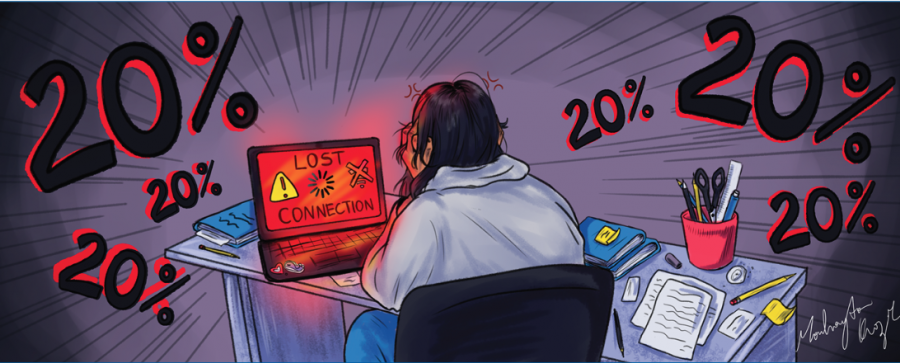E-learning calls for lower final exam percentages
December 18, 2020
As a student’s eyes are glued to Zoom a few feet away from their bed, the once fine line between their home life and school life is blurred. While collaboration with classmates and interaction with teachers in-person was overlooked in the past, South students are now deprived of these key aspects of learning. In a time where safety rules and regulations dictate people’s actions, the 2020-2021 school year has drastically changed education in District 225.
As District 225 nears the end of the first semester, the administration announced that the remainder of the first semester will be remote and finals will expand to a period of four days. Recently, the final exam policy was changed to allow courses to choose a final exam percentage between 5 percent and 20 percent, according to Principal Dr. Lauren Fagel. Fagel stated that even though instructional supervisors make suggestions, the weight of a course’s final exam is ultimately decided by the teachers leading that course.
The Oracle Editorial Board appreciates the efforts made by District 225 to alleviate the stress of finals by allowing teachers to choose their class’s final percentages and by expanding finals to a period of four days. However, students continue to face the pressures of performing well in school amidst a pandemic. Therefore, The Oracle strongly recommends that courses, regardless of level, require finals to be worth less than 20 percent.
“I do think that because exams will be administered remotely, teachers should consider a lower percentage than they have used in the past,” Fagel said. “Many students are doing very well with e-learning, but many students are finding it difficult to engage. Also, academic dishonesty incidents are more frequent right now, given that students may find it easier to cheat on an exam in the remote setting.”
While many teachers have kept their finals at the standard 20 percent, English Teacher Afrodite Skaouris said that this is no longer a requirement. Accordingly, she reduced her finals to 10 percent last year, and will continue to do so for this semester.
She mentioned that regardless of e-learning, she would like to have no finals for her classes, if she had the option to. Skaouris believes that e-learning has put strain on how students learn and thinks that less pressure on finals will help with her students’ mental health.
“With a remote environment, there is just so much screen time for both teachers and students that I have a philosophically hard time arguing that [finals] need to exist,” Skaouris said. “Also, pretty much every class has some sort of big assessment the week before finals, too. They feel redundant.”
Sophomore Kelly Hood mentioned that finding motivation for school during e-learning has become difficult. She emphasized that taking care of mental health under current circumstances should be a priority, rather than being pressured to do well on a final.
“In my opinion, the motivation for school is decreasing now that we are at home with access to a bed,” Hood said. “E-learning has absolutely made it harder for me. Going into a new year and knowing none of my teachers and not a lot of my classmates can be super hard. There is so much pressure and stress that we place on ourselves during the regular school year. I can only imagine how panicked I will feel during Covid-19.”
The American Psychological Association’s website reported that a school’s physical environment promotes “academic motivation and social development.” The Oracle Editorial Board believes that in a time where e-learning is the new normal, and South’s physical environment is no longer accessible, it is crucial for courses to recognize that there is a disconnect in learning for students.
Furthermore, Spanish Teacher Jorge Zamora teaches Spanish AP Language and Spanish III, and his finals for both courses are worth 5 percent this semester. He reports that lowering final percentages for AP courses will harm students.
“The level at which most of the students in AP find themselves is high,” Zamora said. “Most are able to succeed based on the skills they already possess coming into AP. We help them fine-tune those skills and walk them through the ins and outs of the exam itself.”
Zamora said that despite teaching higher level courses, he understands the difficulties that all students are facing while learning from a screen. He noted that he decided the weight of his classes’s finals accordingly.
“Students, as well as staff, have had many obstacles during this period,” Zamora said. “Therefore, we considered all options and decided on what would be best for the students, given the circumstances. It’s only fair that our students don’t get any additional pressure on top of what they’re already doing, trying to juggle all their classes on a computer.”
*The editorial expresses the opinion of the majority of the editorial board and not necessarily that of the publisher, adviser, school administration or staff.



